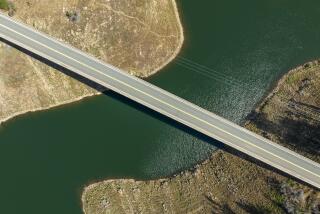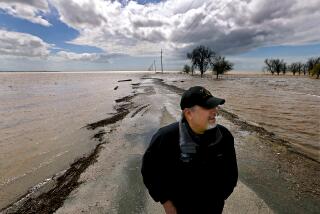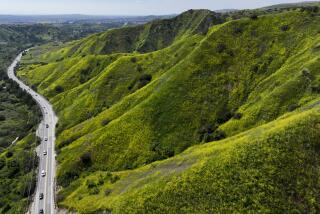Drought Declared by State’s Water Director
- Share via
SACRAMENTO — Gov. George Deukmejian’s chief water adviser on Tuesday declared a drought in California as the governor said the state would impose mandatory water conservation steps only as a “last resort.”
Ironically, Water Resources Director David N. Kennedy made his drought declaration as the first substantial storms in nearly three months swept bone-dry California with rain and snow in the mountains.
“We are delighted to have this rain,” Kennedy said in an interview shortly after Deukmejian made a speech urging intensified water conservation. “We need about six more storms like this, which would be an extraordinary thing . . . (but) clearly this is the second critical dry year in a row. It is a drought.”
Although state officials have repeatedly voiced concern that California is in its second consecutive critically dry year, they have gingerly avoided characterizing the situation as a drought.
Wet Year Predicted
Early in December, state water forecasters confidently predicted that 1988 would be a wet year. But major winter storms all but quit by late January, and the forecasters hastily began revising their expectations as significant new precipitation failed to fall.
The last drought in California occurred in 1977, the driest year on record. Many parts of the state then invoked restrictions on water use, including laws against hosing down sidewalks and driveways, imposition of odd and even days for watering yards and distribution of water conservation devices such as flow restrictors for showers.
Deukmejian and Kennedy both stressed, however, their belief that California could ride out the current situation without mandatory conservation measures--such as water rationing--if Californians cooperate in reducing water consumption by voluntary steps.
Local government entities in some parts of the state, such as San Francisco and water providers in the East Bay, are developing rationing plans that would cut back usage by up to 25%. The Los Angeles Department of Water and Power has proposed a voluntary 10% reduction in water usage.
Contingency Plans
Deukmejian, who last week ordered state officials to draft contingency plans for a “drought emergency,” told an informal press conference after his speech to local government water agency employees that he believes “we will not require any mandatory conservation at this time.”
“But quite obviously, if you get into a very serious drought situation, (and) if you are not receiving cooperation, that would be the last resort,” the governor said.
Water in Storage
Deukmejian and Kennedy, at separate meetings with reporters, said water now in storage, despite the unusually dry winter and spring, likely would carry the state into 1989, provided, as the governor put it, Californians “use water wisely.”
Kennedy talked of “statewide conservation programs” where everyone is “encouraged” to conserve. Noting that virtually all regions of the state are tied into interconnecting water systems, Kennedy told reporters, “We all need to look at this as if we are drinking out of the same well.”
He said Southern California relies heavily on the Colorado River for much of its water supply and is expected to receive its “full supply” from the Colorado both this year and next.
Cooperation Told
Kennedy indicated that he was uncertain whether new legislation would be required to impose mandatory conservation measures and the issue may be moot anyway because “we are getting a lot of cooperation from the water districts we are talking to.”
At the start of the 1983 rainy season, during Deukmejian’s first year in office, Kennedy ordered drought-era “Save Water” bumper stickers removed from his department’s fleet of automobiles and the water conservation symbol struck from department letterheads. At the time, a Kennedy spokesman said they constituted “hollering wolf.”
Asked if he intended now to reactivate unused bumper stickers, which reportedly were put into storage, Kennedy said he doubted that they still would be usable. As for other similar conservation education steps that he might have in mind, Kennedy said, “We’ll just have to take a look at what is the best way to do it.”
More to Read
Sign up for Essential California
The most important California stories and recommendations in your inbox every morning.
You may occasionally receive promotional content from the Los Angeles Times.










